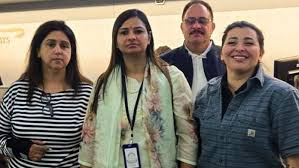CBI gets custody of accused in Rs 1.44 crore cheating case, over 2 decades after she fled to US

After more than two decades on the run, Monika Kapoor, a key accused in a ₹1.44 crore fraud case, is finally back in India. The Central Bureau of Investigation (CBI) took custody of Kapoor in the United States and flew her back to face trial. She had fled the country in 1999 to avoid arrest in a major import-export scam.
The Fraud That Sparked a 20-Year Chase
The case began in 1998 when Kapoor and her brothers, Rajan and Rajiv Khanna, allegedly used fake documents to obtain import licenses. These licenses allowed duty-free gold imports. The trio then sold the licenses to a private firm at a premium instead of using them for actual trade.
This scheme caused a loss of ₹1.44 crore to the government. The CBI accused the group of forging shipping bills, bank certificates, and other documents to mislead officials.
As the investigation picked up pace, Kapoor disappeared. She left India for the United States and stayed there for over two decades.
How the CBI Brought Her Back
The CBI filed a First Information Report (FIR) and began legal efforts to extradite Kapoor. In 2010, India submitted a formal request to the U.S. under the bilateral extradition treaty. Legal proceedings stretched on for years.
Eventually, the Eastern District Court of New York approved Kapoor’s extradition. On July 9, 2025, CBI officials reached the U.S., took custody of her, and brought her back to India.
She is now expected to appear before a special CBI court in Delhi.
A Big Win Against Economic Fugitives
Kapoor’s return marks a rare victory for Indian agencies tracking economic offenders abroad. In many high-profile cases, accused individuals remain in foreign countries for years due to legal delays and diplomatic hurdles.
Unlike cases such as Nirav Modi and Vijay Mallya, Kapoor’s extradition concluded successfully. Legal experts say this case could serve as a benchmark for future extradition efforts. It shows that international cooperation can help bring fugitives to justice—even after long delays.
What Happens Next?
The CBI will produce Kapoor in court and seek her judicial custody. A supplementary charge sheet may follow, detailing the recent developments and evidence gathered from U.S. proceedings.
Kapoor is likely to face charges related to cheating, forgery, and criminal conspiracy. Her defense may argue that the delay weakens the case. However, investigators insist that Kapoor evaded justice for over two decades and should not benefit from the delay she caused.
Her brothers, who were also named in the case, may now face renewed investigation.
Public Reactions and Legal Significance
The public has responded with a mix of relief and skepticism. Many welcome the CBI’s persistence, while others question why it took so long to bring Kapoor back.
Still, her extradition strengthens the image of Indian law enforcement. It proves that fugitives cannot rely on time or distance to escape justice.
The CBI has confirmed it is pursuing other economic offenders with similar dedication. Kapoor’s return may motivate other countries to act faster on pending extradition requests.
A Message to White-Collar Criminals
Kapoor’s case sends a strong message: running away won’t make a crime disappear. While the process may be slow, law enforcement continues to pursue those who cheat the system.
Her return also highlights the importance of global legal cooperation. Extradition requires patient diplomacy, strong legal documentation, and the willingness of partner countries to act.
Conclusion
Monika Kapoor is finally back in India to face justice, more than 25 years after the alleged crime. Her extradition is a significant win for the CBI and the Indian government. It shows that even long-forgotten cases can see justice if authorities remain determined.
As Kapoor prepares to face trial, her story reminds us that justice may take time—but it does arrive.






